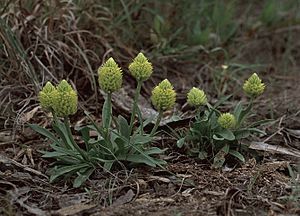Candyroot facts for kids
Quick facts for kids Candyroot |
|
|---|---|
 |
|
| Scientific classification | |
| Genus: |
Polygala
|
| Species: |
nana
|
| Synonyms | |
|
Polygala lutea var. nana Michx. 1803 |
|
Candyroot, also known as Polygala nana, is a small plant that grows in the southeastern United States. Its root tastes sweet, like licorice, if you chew it. This sweet root usually stays hidden underground until the plant blooms. Interestingly, tiny ants help spread the seeds of the candyroot plant around!
What is Candyroot?
How it Got its Name
A French plant expert named André Michaux first described candyroot in 1803. He thought it was a type of another plant called Polygala lutea. Later, in 1824, a Swiss expert named Augustin Pyramus de Candolle decided it was special enough to be its own species. The name nana comes from a Latin word meaning "dwarf," which makes sense because it's a small plant!
What Candyroot Looks Like
Candyroot is a small plant that often grows in clumps. It usually reaches about 2 to 4 inches (5 to 10 cm) tall. Sometimes it can grow a bit taller, up to 4 to 6 inches (10 to 15 cm).
Its leaves are shaped like spoons. They are about 0.5 to 2 inches (1.5 to 5 cm) long and 0.15 to 0.8 inches (0.4 to 2 cm) wide.
The plant has bright yellow flowers that grow in a cluster at the top. These flower clusters are about 0.8 to 1.6 inches (2 to 4 cm) tall and 0.6 inches (1.5 cm) wide. You can see these yellow flowers from April to June in most places. In Alabama, they bloom from March to October. In the Everglades in Florida, they can flower all year long!
The seeds of candyroot are very tiny, less than 1 millimeter in size. As its name suggests, the root of this plant has a sweet taste, similar to licorice.
Candyroot looks a lot like another plant called Polygala lutea, but Polygala lutea is taller. It also looks similar to a rare plant called P. smallii, which grows in Miami-Dade County. You can tell them apart because P. smallii has seeds that are larger than 1 millimeter.
Where Candyroot Grows
You can find candyroot across the southeastern United States. It grows from eastern Texas all the way to Florida. It is also found in states like Louisiana, Arkansas, and north into the Carolinas. In Arkansas, it grows in specific areas like Ashley, Bradley, and Calhoun Counties. These counties mark the furthest northwest that candyroot is found. This plant likes to grow in damp soil. You can often spot it in open fields or in forests where pine trees grow.

